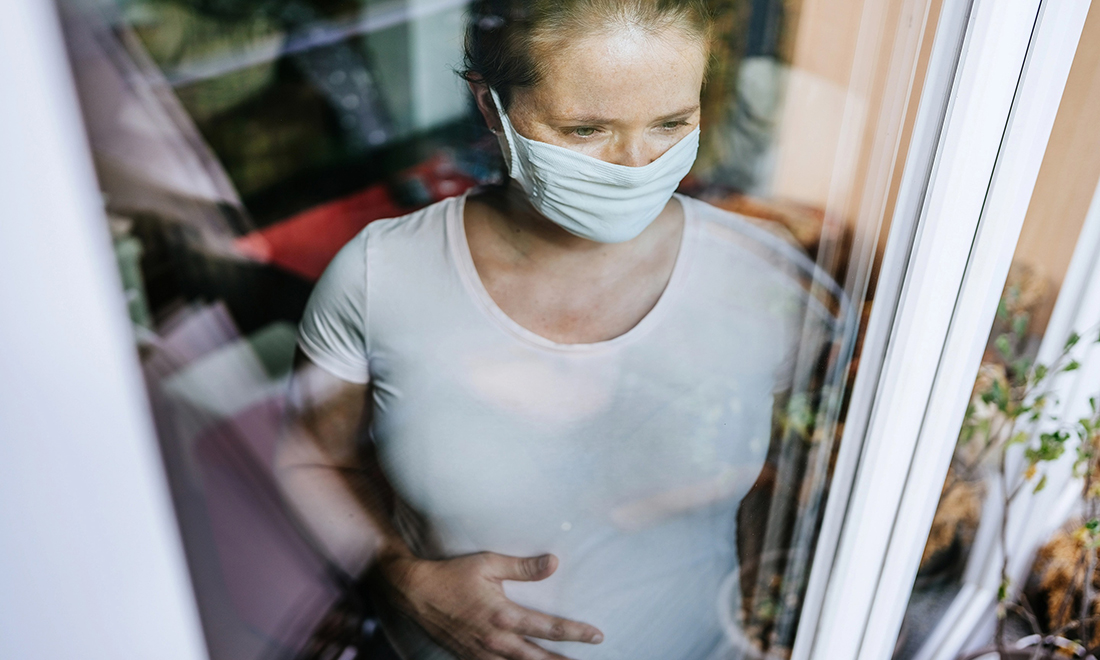
4月6日发表在《儿科学》(Pediatrics)上的一项研究表明,孕妇有可能将新冠病毒传染给胎儿,破坏胎盘并导致大脑损伤。
迈阿密大学(University of Miami)研究人员记录了两例孕妇怀孕期间感染新冠后生产的病例。两名婴儿出生时病毒检测结果均为阴性,但都出现了癫痫、发育延迟以及长大过程中头部尺寸异常小的问题。
最终两名婴儿都夭折了。
迈阿密大学米勒医学院的新生儿学家,也是该论文高级作者沙赫纳兹·杜阿拉医生告诉《财富》杂志,虽然这种结果很少见,不过怀孕或计划备孕的人们都要认识到新冠病毒给胎儿造成的风险。
“多数处于育龄的年轻人对待新冠就像对待小病毒感染一样,不想折腾接种疫苗或采取预防措施,”她说。
“他们认为不会因此生病。事实并非如此。病毒会对婴儿造成严重影响。”
医疗人员已经发现,大约每千名婴儿中就有两三名出生时新冠病毒检测呈阳性,其中一些记录为死胎。可能还有很多婴儿因母亲怀孕期间感染新冠而神经系统受影响。杜阿拉说,由于婴儿出生时病毒检测结果并非阳性,或者因为神经系统问题尚未出现,医生可能会忽略相关线索。
杜阿拉指出,在她和团队研究的病例里,病毒是在婴儿组织中发现的,一般只有尸检时才会检测出,而且需要医疗人员刻意去查才会发现。
“可能还有其他类似病例没得到承认。”她说。“其他人会说,‘这不可能是新冠,因为婴儿拭子检测结果不是阳性。’但也许是研究不够深入。”
杜阿拉希望该项新研究能提高家长和医疗人员的认识。
有一点令人稍稍放心,即感染新冠的孕妇情况似乎有些特殊。其中一人2020年年中感染新冠后转为重症数周,另一人似乎在2021年年初怀孕期间感染了两次,但从未出现症状。两位母亲接触病毒时都在怀孕25周左右,都没有接种疫苗。不过其他情况下可能也会导致类似的结果。杜阿拉说,这正是现在研究人员希望弄清的事。
关于新冠相关妊娠并发症的建议
想告诉准妈妈的是:“对祖父母、服用类固醇的人或免疫力低下的人采取同样的预防措施,”她说。
考虑在孕前或孕早期接种新冠疫苗。
如果可以,尽量母乳喂养至少6个月,届时婴儿能接种第一剂新冠疫苗。如果母亲对新冠有免疫力,可以通过母乳将抗体传给婴儿。
戴口罩等预防措施有助于降低怀孕期间感染新冠的风险。
如果孕妇怀孕期间感染过新冠,她建议婴儿父母及时告知儿科医生,倘若婴儿发育过程出现任何延迟,以及出现行为差异和听力问题时也要告知。
“最关键的信息是,学界对这种病毒还不太了解——毕竟只研究了四年。”她说。“但我们知道,(病毒)在特殊人群中症状也会特殊。”
“我们知道老年人的症状,会受到什么影响。婴儿同样面临风险,尽管我们还不知道风险是否广泛存在,或者妊娠期有没有特定的风险点,又或者(婴儿)有没有哪些情况导致更容易受影响,”她补充道。她还指出,目前尚未对婴儿做基因检测。
杜阿拉说,在这一点上,研究人员面临的问题比答案多。但他们都确信一点:怀孕期间感染新冠是个问题。
杜阿拉指出:“也许只有少数人遇到,但肯定是个问题。”(财富中文网)
译者:梁宇
审校:夏林
4月6日发表在《儿科学》(Pediatrics)上的一项研究表明,孕妇有可能将新冠病毒传染给胎儿,破坏胎盘并导致大脑损伤。
迈阿密大学(University of Miami)研究人员记录了两例孕妇怀孕期间感染新冠后生产的病例。两名婴儿出生时病毒检测结果均为阴性,但都出现了癫痫、发育延迟以及长大过程中头部尺寸异常小的问题。
最终两名婴儿都夭折了。
迈阿密大学米勒医学院的新生儿学家,也是该论文高级作者沙赫纳兹·杜阿拉医生告诉《财富》杂志,虽然这种结果很少见,不过怀孕或计划备孕的人们都要认识到新冠病毒给胎儿造成的风险。
“多数处于育龄的年轻人对待新冠就像对待小病毒感染一样,不想折腾接种疫苗或采取预防措施,”她说。
“他们认为不会因此生病。事实并非如此。病毒会对婴儿造成严重影响。”
医疗人员已经发现,大约每千名婴儿中就有两三名出生时新冠病毒检测呈阳性,其中一些记录为死胎。可能还有很多婴儿因母亲怀孕期间感染新冠而神经系统受影响。杜阿拉说,由于婴儿出生时病毒检测结果并非阳性,或者因为神经系统问题尚未出现,医生可能会忽略相关线索。
杜阿拉指出,在她和团队研究的病例里,病毒是在婴儿组织中发现的,一般只有尸检时才会检测出,而且需要医疗人员刻意去查才会发现。
“可能还有其他类似病例没得到承认。”她说。“其他人会说,‘这不可能是新冠,因为婴儿拭子检测结果不是阳性。’但也许是研究不够深入。”
杜阿拉希望该项新研究能提高家长和医疗人员的认识。
有一点令人稍稍放心,即感染新冠的孕妇情况似乎有些特殊。其中一人2020年年中感染新冠后转为重症数周,另一人似乎在2021年年初怀孕期间感染了两次,但从未出现症状。两位母亲接触病毒时都在怀孕25周左右,都没有接种疫苗。不过其他情况下可能也会导致类似的结果。杜阿拉说,这正是现在研究人员希望弄清的事。
关于新冠相关妊娠并发症的建议
想告诉准妈妈的是:“对祖父母、服用类固醇的人或免疫力低下的人采取同样的预防措施,”她说。
考虑在孕前或孕早期接种新冠疫苗。
如果可以,尽量母乳喂养至少6个月,届时婴儿能接种第一剂新冠疫苗。如果母亲对新冠有免疫力,可以通过母乳将抗体传给婴儿。
戴口罩等预防措施有助于降低怀孕期间感染新冠的风险。
如果孕妇怀孕期间感染过新冠,她建议婴儿父母及时告知儿科医生,倘若婴儿发育过程出现任何延迟,以及出现行为差异和听力问题时也要告知。
“最关键的信息是,学界对这种病毒还不太了解——毕竟只研究了四年。”她说。“但我们知道,(病毒)在特殊人群中症状也会特殊。”
“我们知道老年人的症状,会受到什么影响。婴儿同样面临风险,尽管我们还不知道风险是否广泛存在,或者妊娠期有没有特定的风险点,又或者(婴儿)有没有哪些情况导致更容易受影响,”她补充道。她还指出,目前尚未对婴儿做基因检测。
杜阿拉说,在这一点上,研究人员面临的问题比答案多。但他们都确信一点:怀孕期间感染新冠是个问题。
杜阿拉指出:“也许只有少数人遇到,但肯定是个问题。”(财富中文网)
译者:梁宇
审校:夏林
COVID can travel from a pregnant mom to a fetus, breaching the placenta and causing brain damage, according to a study published Thursday in Pediatrics.
Researchers with the University of Miami documented the cases of two infants born to mothers who had COVID during pregnancy. Both infants tested negative for the virus at birth, but experienced seizures, delays in developmental milestones, and a head size that became disproportionately small with time.
Both infants eventually died.
While such outcomes are rare, those who are pregnant or planning to become pregnant need to be cognizant of the risks COVID poses to fetuses, Dr. Shahnaz Duara, a neonatologist at the University of Miami’s Miller School of Medicine and senior author on the paper, tells Fortune.
“Most young people who are child-producing age treat COVID as if it’s going to be a little viral infection, and they don’t want to bother with getting vaccinated or taking precautions,” she says.
“They’re thinking it’s not going to make them sick. And it doesn’t. But it can have a big impact on the baby.”
Medical professionals were already aware that roughly two or three babies out of every thousand are born COVID-positive, with some reports of stillbirth among them. It’s possible that additional babies whose mothers had COVID while pregnant have been born neurologically impacted. Doctors may not have connected the dots because the babies didn’t test positive for the virus at birth, Duara says, or because the neurological issues have yet to surface.
In the cases Duara and his team studied, the virus was discovered in infants’ tissue–a finding that would generally only occur at autopsy, and only if health professionals were looking for it, she notes.
“There may have been other cases like this that have gone unrecognized,” she says. “Others would have said, ‘This can’t be COVID; the babies didn’t swab positive.’ But maybe [the babies] didn’t get studied to the extent we studied” these babies.
Duara hopes the new research raises awareness among parents and medical professionals alike.
Reassuringly, the mothers’ cases appear unusual. One was incredibly sick with COVID for weeks during mid-2020, and the other appears to have been infected twice during her pregnancy during early 2021, but never had symptoms. Both mothers were around 25 weeks of gestation when exposed to the virus, and neither were vaccinated. But other patterns could lead to similar outcomes. That’s what researchers are trying to figure out now, Duara says.
Advice about COVID-related pregnancy complications
His message to moms-to-be: “Use the same precautions you would for your grandparents, for those on steroids or who are immunocompromised,” she says.
Consider getting the COVID vaccine ahead of getting pregnant, or early in your pregnancy.
If you’re able, breastfeed your child at least until 6 months of age, when they’re eligible for their first COVID vaccine. If a mother has immunity to COVID, she can transfer antibodies to her baby via breast milk.
Other precautions, including masking, can help reduce the risk of becoming infected with COVID while pregnant.
When it comes to babies whose mothers had COVID during pregnancy, she recommends parents tell their pediatrician, and report any delays in developmental milestones, as well as behavioral differences and hearing issues.
“The message really is that we don’t know much about this virus yet–we’ve only been at it for four years,” she says. “But we know that in special populations, [the virus] behaves in special ways.”
“We know about the elderly, what it does to them. Babies are also at risk, though we don’t know yet if that risk is across the board, or if there are specific points in gestation that are at risk, or something in [infants’] own data that makes them more vulnerable,” she adds, noting that genetic testing has not yet been performed on infants.
At this point, researchers have more questions than answers, Duara says. But they know one thing: COVID in pregnancy is a problem.
Notes Duara: “Perhaps it’s only a problem for a handful of people, but it’s a problem.”






